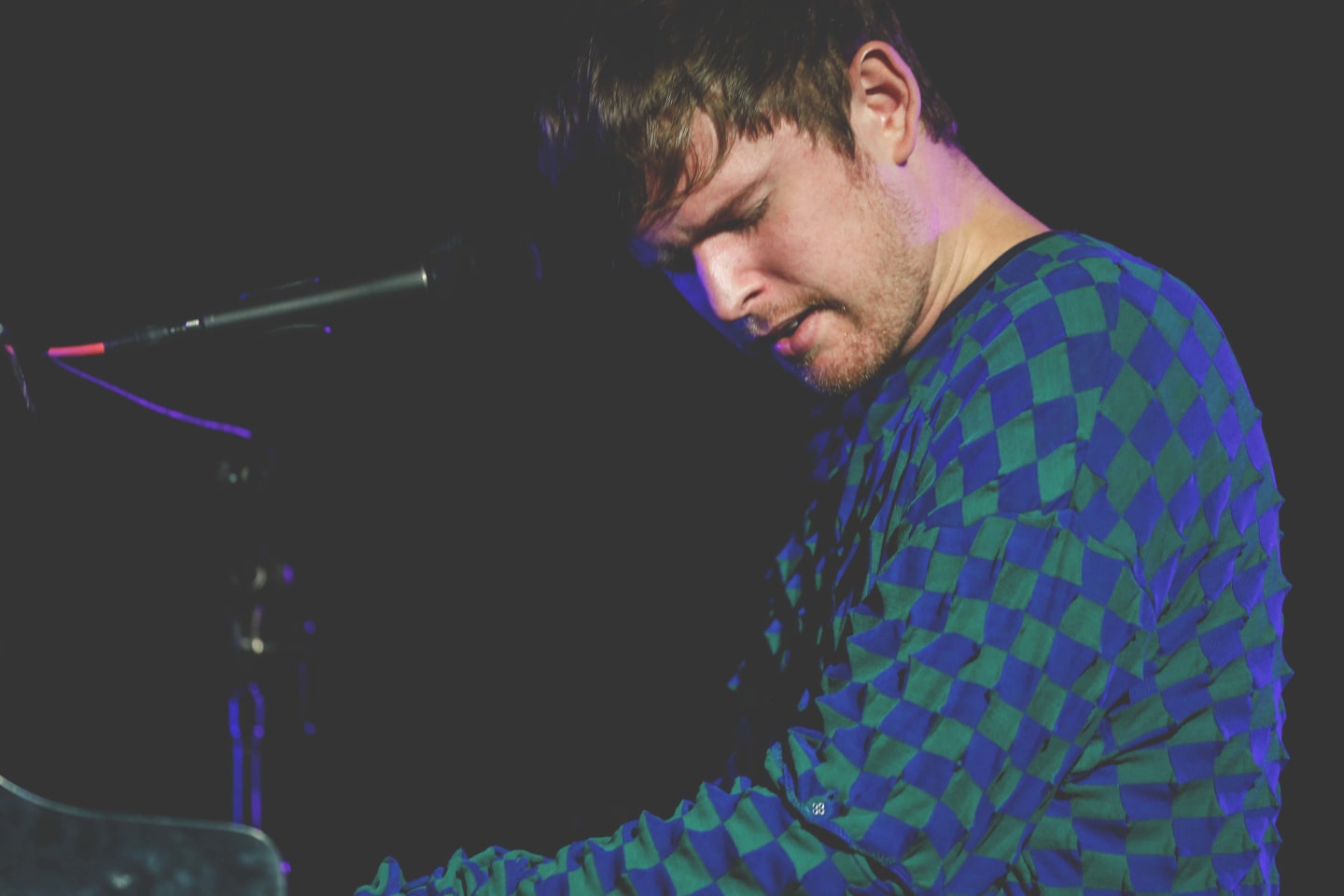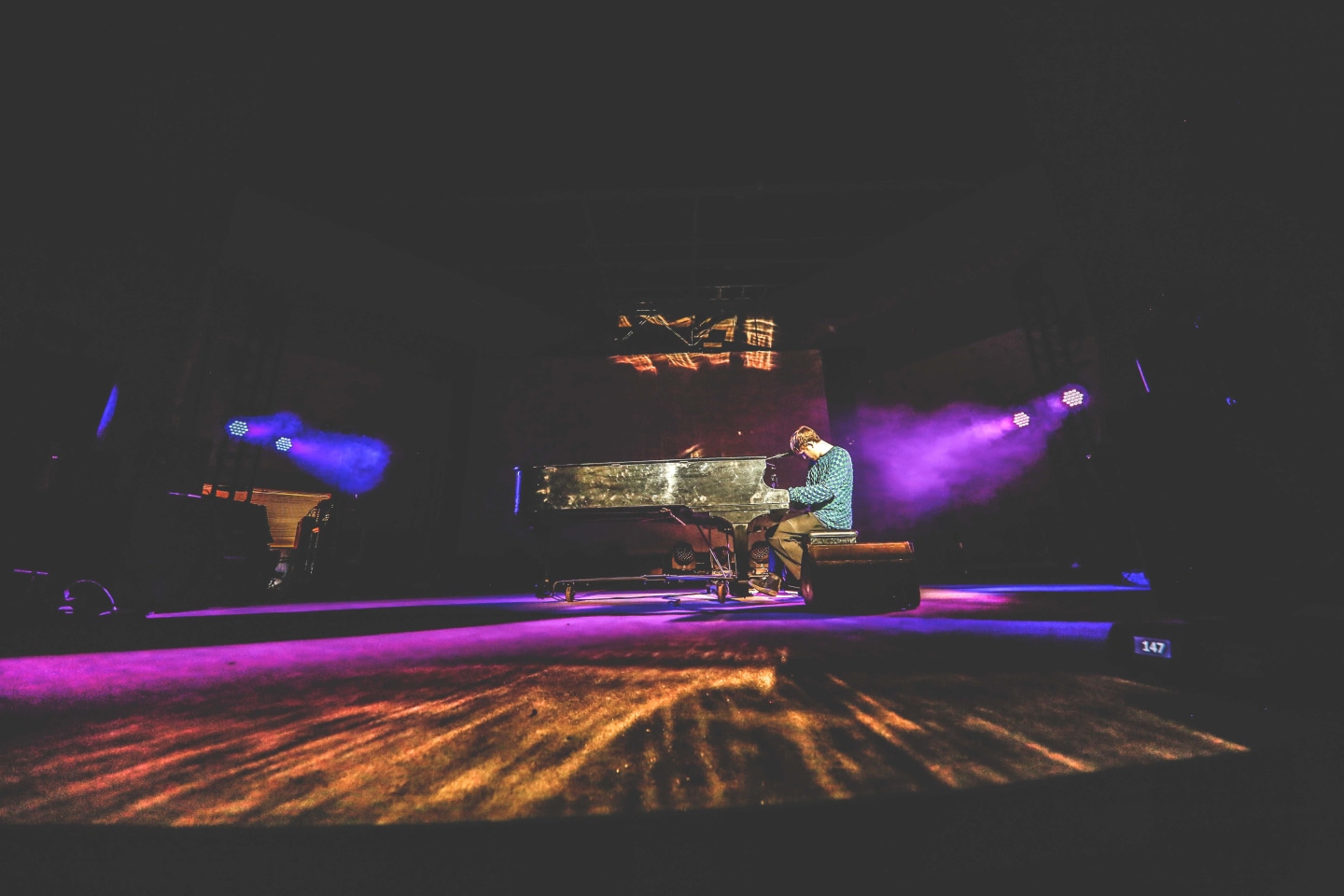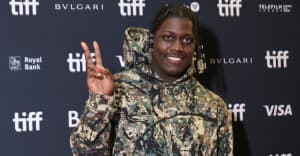How James Blake Found Freedom Through Minimalism And Collaboration
At FORM Arcosanti, the London singer-songwriter-producer talks the importance of his first solo piano performance and the liberation in vulnerability.
 James Blake performs at FORM Arcosanti Festival 2017.
Jacqueline Verdugo
James Blake performs at FORM Arcosanti Festival 2017.
Jacqueline Verdugo
James Blake is seated in a tiny green room before he stands up to hug me — his towering slender frame nearly grazes the low ceiling. In two hours, he will scale back his typical large-stage performance and close out FORM Arcosanti Festival with his first-ever solo piano show. Before Blake’s debut, the singer-songwriter’s absorbing vocals and electronic keyboard along with his band members, guitarist Rob McAndrews and drummer Ben Assiter, worked as a unit to transfix audiences with sublime offerings, in cities like London and Los Angeles. Blake maintains that those collaborations won’t end, but now is the time to finally take the risk of unveiling himself in the place where he feels the safest. “I’ve always felt most comfortable at the piano,” he told me.
Ever since the release of his 2016 album,The Colour in Anything, the bright-eyed musical polymath has been shedding his emotional and creative armor to take steps towards having the most open-minded and honest musical experiences possible. He’s since relinquished his need for control and surrendered himself to the magic that blooms from imperfection. And now, on a breezy night in the Arizona desert, Blake has prepared himself to peel off the final layer of his vulnerability and genius. Tonight, he’s equipped with nothing more than a spotlight, a collection of cherished songs, and a grand piano.
Before Blake took the main stage at FORM, we spoke about what inspired his new minimalist approach to performances, working with Kendrick Lamar, and the freedom he’s found in true vulnerability.
How are you feeling about performing your first show without your band and only a piano?
It’s something I’ve wanted to do for a long time, literally for years. I remember seeing Nina Simone Live in Montreal and thinking, I would love to do a solo set. When I’m playing with Ben and Rob, which I love to do, I’m not with a real piano. With a real piano, there’s a chemistry that I can have with it that I can’t have with a keyboard. There’s something fundamentally different about it and I’ve never really been able to take a full piano on tour, this gives me an opportunity to do the thing that I’ve always loved to do and the thing that is the reason that I make music in the first place. Improvising on the piano has been my bread and butter since I’ve was a child. This is actually extremely less nerve wrecking than coming out and doing what we’ve been doing.
So what’s fundamentally different about the connection with the piano versus the keyboard?
The electric pianos that I take on the road, I have whole different connection with them. There’s a lacking in chemistry. And there’s pure physics in it too. It’s also, the place that I’ve always felt most comfortable. Sitting in front of a piano is my favorite places to be. It’s where I’ve felt the safest. And maybe that’s because I don’t have any bad recollections or memories there. It’s always been a place that’s a catharsis and it makes me feel quite comfortable on the stage to have that between me and the audience. I probably wouldn’t be able to get up and do it without it.
What finally led you to the decision to scale down and perform with just the piano?
By releasing the records I’ve released, the expectation of me may be something quite different. But at this point, I think I’ve made a lot of electronic records and I think I’ve made my statement in regards to that. Concisely enough that I can go and do things and people won’t be confused. It might be a bit strange for people because there is nothing electronic there to accompany me but, at the same time, I think the some of my most successful efforts have come from sitting at that thing. Most of the songs I’m going to play tonight are going to translate well because they were written at the piano.
How will these solo piano shows change the instrumentation of certain songs? Will you just perform them without that or stick only to songs that don’t require those other sounds?
I’m probably not going to try and recreate electronic sounds. Essentially, there will be some songs in there but I don’t really know which ones I’m going to play until I get on stage. I want it to feel like a new experience. I would be weaving my way through certain material everyone seems to think.
And that’s different for you because when you’re on stage with other people they have to know what’s coming up next.
What I want to do is improvise as much as I can. That means doing what I do when I usually play is pretty much writing on stage and the way the songs are played change over time. That’s my way of making things a little bit tense myself. The best part is that part when you know when a little bit too many people come out and you’re not quite sure what’s going to happen. And then there’s that sweet spot of slight uncertainty which maybe is the thing that might make it most fun. In the same way that when you’re playing live, you’re creating a moment that should be tangible but that moment that you’re trying to create is one of spontaneity. For example, when stand-up comedy loses it’s snap is when it’s no longer spontaneous. It’s the same with improvisation. We’ve been touring certain songs and we’ve been playing them sometimes the same way which is a huge step away from that and it puts me really at the deep end and I don’t really know what’s going to happen, which is why I’m trying it here because there’s an element of spontaneity in this place.
 Jacqueline Verdugo
Jacqueline Verdugo
“It takes a certain level of comfortability to actually pursue a little danger. The more that I’ve come out of my shell, the more that I’ve been able to accept the moments that there will be moments that I have no control over.”
On the topic of spontaneity, you’ve hit a point of evolution and now it seems that you feel secure and willing to take more risks and show that growth.
It takes a certain level of comfortability to actually pursue a little danger. The more that I’ve come out of my shell, the more that I’ve been able to accept the moments that there will be moments that I have no control over. Although I may fuck it up and at that point I’m relying on my musical personality to get me back on track or not. There’s a lot of unexpected moments and for me that’s just really fun. It is a different idea yet spontaneous representation.
In your earlier music, one could gather that you weren’t that hesitant to express your feelings. But vulnerability is different and adds another layer to that.
Actually, I would disagree. I think I have been hesitant to say how I feel sometimes. I think maybe in my recent music, I’ve been a little more bare but I think when I first started I was certainly more self-conscious, artistically. I’d make some very bold decisions but in my lyrics, I was very much so guarded. I actually think this format of playing is the most bare it could possibly be unless I was just standing there with a microphone and no clothes on. The only way for me to be truly, bare.
At this time in the world, there’s a lot that adds to its noise and energy both socially and creatively. Do you feel a larger calling for minimalism in art?
The hardest thing about making minimal music is that the elements that are left have to worth revisiting have to be worth listening to and I don’t always get that right. Sometimes I stumble along a strong idea and it’s allowed to be minimal. The piano and vocal format leaves no veil and no way for me to run if something goes wrong or I’m not performing well. There’s something nice about that for me because it’s the thing I like to do the most and it’s nice for me to expose that and feel comfortable in it.
Another thing that is ironic about this solo step is the amount of collaborations you’ve done recently. It aligns with that notion of opening up and relinquishing control.
Definitely. That is actually the common thread between those statements — letting go.
Trusting yourself and learning from those interactions with other artists.
I’ve learned a lot from collaborations and I would say that my relationship has been a collaboration as well. Realizing that I actually didn’t know anything about certain things made me feel, initially very stupid but eventually made me much more accepting of things and less judgmental. And I think that is a prerequisite to collaborating because I think if you’re very particular about your music and absolutely have full control and you never let any of it up, that goes hand in hand with the type of personality like, “I don’t want to work with other artists.” And that’s kind of where I was. Now, let’s say, within reason, I’m still basically choosing people that I fucking love and personal relationships and people who just get on with. It’s amazing. A couple of years ago I remember telling my girlfriend, “I want to make more friends. I don’t have many musician friends.” Actually, musicians are a special breed a quite different people. And it didn’t always line up like that. My friends now, they’re either quite unusual for musicians or they do something completely different.
“I feel very good. I feel very free. God, that’s a big word isn’t it?”
Everyone loves when you and Frank Ocean collaborate. Where do you two connect on the way that you read or process emotions in terms of songwriting?
He’s such an idiosyncratic. He’s so instantly recognizable. It’s not just his voice it’s turn of phrase. That’s just something remarkable that I have learned a lot from.
It’s obvious that you two have musical chemistry but where do you connect emotionally when it comes to songwriting?
We’re quite different in a lot of ways. But the songs that I’ve had input to on his record, I don’t really know in what part of the middle we met. He’s an anomaly, it’s quite hard to describe that relationship, so I’m not gonna try. [Laughs]
We spoke with Sounwave about your work on “ELEMENT.” He said you’ve been sending Kendrick music a lot. When did you start that?
Yeah, recently. I did send him a bunch of music and I was just hoping that he’d listen to it. I’d met him a few times before and they came to our show in L.A. We’d been in touch various times and he’d come to the studio and listen to stuff and we got on and I sent him some music while I was on the road when I was in Mexico. I got an email and he said, “Can you turn something in tonight?” I sent him a thing that I’d done and he took the chords and that became a part of “ELEMENT.”
I think that that was not the most organic way, sending music to someone by internet and it ends up in a tune but I just knew that I could trust them with my music because they have a flawless record of production, that unit that Kendrick works with. Sounwave and the rest have a really good understanding of how music works and I was really excited about to hear it. When that got sent back I was like, “Oh God. We should do this again.” We’ll see about the future but hopefully we’ll be able to sit down and piece things together. Either way actually, it’s something great and firm about that happening that way.
You left off after The Colour in Anything in this new place sort of blooming. Creatively, where are you now in your process?
I feel very good. I feel very free. God, that’s a big word isn’t it? I feel like I have license musically to go wherever I want to and that is an unbelievable privilege.
It’s like agency versus control.
Exactly, the freedom from needing control is a big part of it. Full control over music gives you all of the credit. When you need that credit, that can be a negative thing to your person and your ego. It can be reflective of something lacking in you or some kind of fracture and you want to get all of the recognition and maybe to never be underestimated. If you can feel, not just accepted but validated before you’ve even left the house then you win a huge battle of your own ego. And that has been part of the prerequisite of working with other people or how to let go of the smaller things that can keep you up at night as an artist or an writer. Learning to accept the thing about you that other people are hearing that you can sometimes miss that you can desperately try and avoid confronting by decorating constantly until something is just an embarrassment of decoration. It encompasses quite a lot of this whole idea that changed for me recently and that’s what leaves me with a lot more freedom and that’s what I mean when I say, “I feel free.”
So are you working on any new material?
I have some new music, and I am going to release some of it this summer. I’ve just been making tunes. Is it going to be singles or a project? I think I’ve probably got a few single tunes but I don’t know if they’re singles. [Laughs]. At some point I would like to release a record but at the moment I feel no need to rush myself. I’m not in part of a touring cycle. We’re doing this Radiohead support tour, which is great. I’m writing as much as I can. I’ve been producing hip-hop things but I can’t talk about those ye — they’re collaborative productions and beats. It’s this constant balancing act between all the things that I like doing and that couldn’t be more ideal to be able to do producing, making my own music, piano shows, and shows with Ben and Rob. This [solo piano show] was the last of many pieces of the puzzle.
